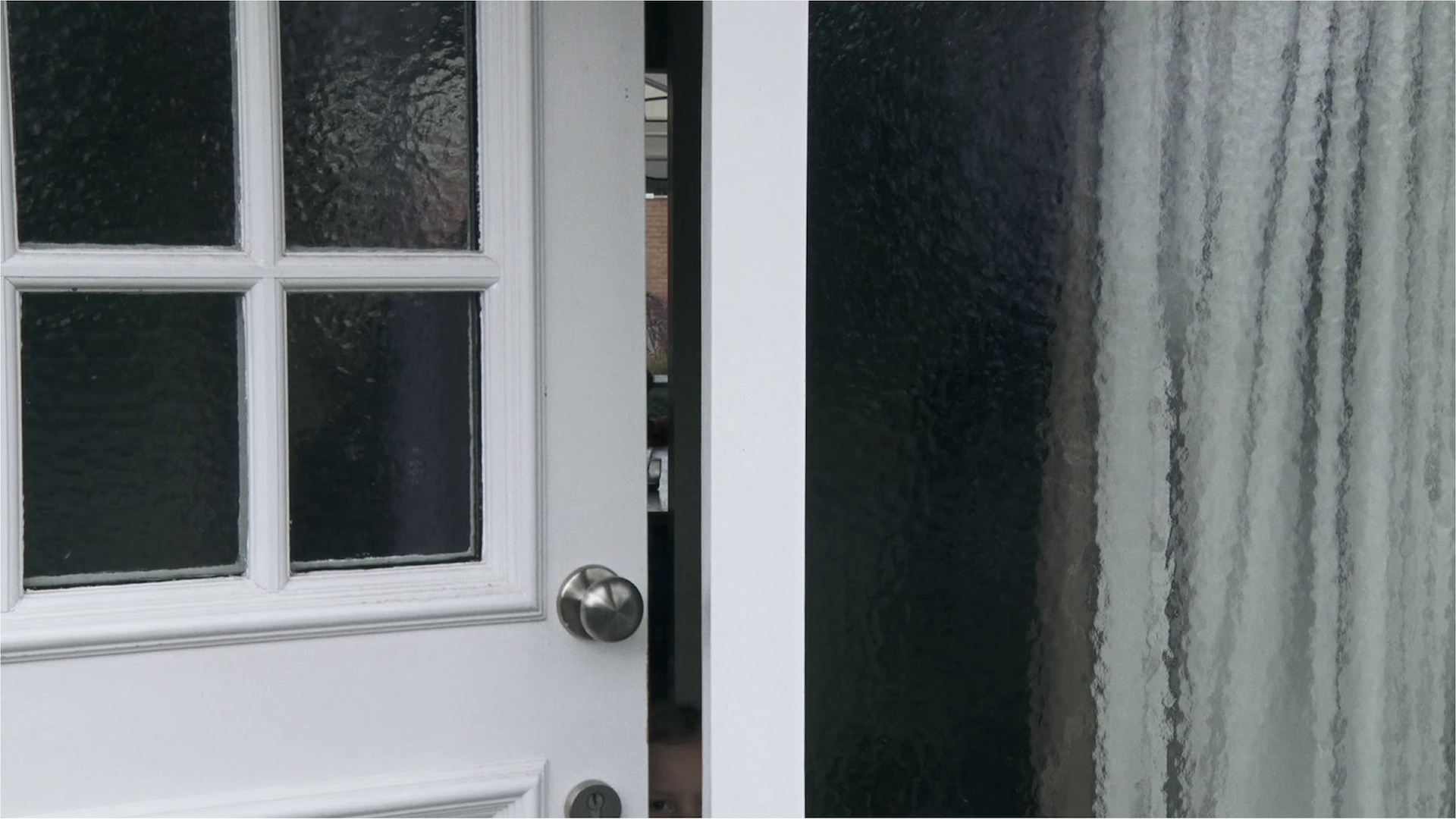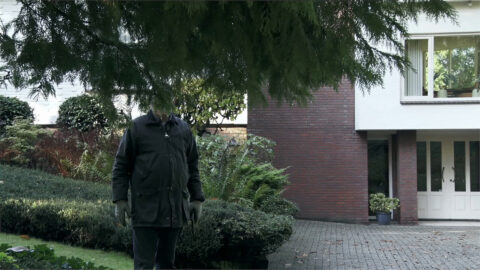Interview: Guido Hendrikx om sin film ‘A Man and a Camera’
Denne artikel er knyttet til filmen 'A Man and A Camera'.
Et gådefuldt væsen vandrer rundt i det hollandske bagland, og retter lydløst et kamera mod alt, hvad den møder. Snart står den foran en dør. Mødet med en uindbudt, uigennemskuelig kameraoperatør, hvordan vil regionens indbyggere så reagere?
‘A man and a camera’ er en morsom og foruroligende, hverdagsagtig og overjordisk, en uendelig overraskende provokation: en omvæltning af dokumentarfilm og en magtdynamikker, en undersøgelse af den menneskelige natur, et rendevous med det virkelige.
Her fortæller Guido Hendrikx om sine tanker bag filmen.
What are the origins of the film?
»Nearly a decade ago, I started approaching and silently filming random passersby on the streets of Belgium. As I operated the camera, I felt this strange, exhilarating mixture of shame and power. I set the material aside and revisited it several years later. By this point I desired to better understand that power relationship and explore the tension that existed in these encounters. I also wanted to see what level of intimacy was possible when operating with this technique. What happens when the fly on the wall becomes more like a fly in the room? So I took this project on in a more serious manner, shifting from the street to people’s doorsteps. Unlike my early street experiments, this gave people a chance to escape, as they could always shut the door, and it also created a consistent arena for all encounters. I began conceptualizing a very strict set of rules«.
What were those rules?
»One was that I could never speak, which included nonverbal communication. If I broke that rule, I had to delete the footage. When I first started filming, people would ask if I was with a certain broadcaster, and when I would nod a response, all the tension dissipated. Another rule was that once a door was opened, the person I’m filming must direct the encounter. They were in charge, deciding what to do and when to stop. This was a way of giving up control. And the third rule was that I would confine myself to ordinary people in ordinary environments«.
Why ordinary people, and where did you find them?
»The vast majority of documentaries today, including those that are labeled ‘creative’ or ‘artistic,’ are exploiting extraordinary subjects using ordinary forms. They follow their subjects, be they famous singers, or exotic subcultures, or oppressed peoples, like a labrador retriever. The author doesn’t have a voice. With this film, I attempted to subvert that contemporary documentary formula. I shot in every province of the Netherlands, but I tried to avoid the more familiar places, the bigger cities and places where “things happen.” Most of the material comes from the borders of the country, close to Belgium and Germany, and also the seascape«.
Were you met with much animosity?
»Not really. Partly for safety reasons, I always carried around a piece of paper explaining that this footage wouldn’t be used without permission. In the neighborhood where the film ends, one of the houses had biblical quotes on the window, and a woman inside was filming back. As I dropped the paper through her mail slot, she grabbed my hand and tried to break my fingers. There were quite a few times where people were on the edge of turning aggressive, but when I had the feeling it would happen, I would quit. And when we talked, those people said if I had waited a few seconds more they would have punched me and I would have fallen down their stairs. These were the exceptions to the rule of amity«.
Why do you think some people let you into their homes?
»Time is important. The moment when I appear, the exact moment, probably plays a part in how they react. If I ask myself how I would respond if someone showed up at my door this way, it would really depend on what was going on in my mind at that exact moment. For those who did allow me in, I believe there was an unspoken, mutual interest in figuring out exactly what was happening. I visited somewhere between 300 and 400 houses, and of those visits, eight people let me in. Why depends person to person. When I was conceptualizing this project, I thought it would be for obvious reasons like loneliness or vanity. But reality provided something less cynical. I believe the trust that’s present in this film is a miracle«.
There’s a crucifix in the first home you enter. Do you think religion could be a factor?
»I think it is a possibility. When I revisited everyone in the film to obtain release forms, some turned out to be religious. One quoted a verse from the Bible, Hebrews 13:2: “Do not forget to show hospitality to strangers, for by so doing some people have shown hospitality to angels without knowing it.” Something we discovered during the editing process was this mystical element. When that unnerving, supernatural feeling revealed itself in the footage, we started to embrace it and incorporate it into the film’s atmosphere, especially the sound design«.
The clock becomes an important part of the sound design. How do you approach time in the film?
»The concept of real time is among the most unique aspects of documentary filmmaking, and that’s something we wanted to draw on. You may forget about time in the sense of day and night, or seasons. The whole film is structured as slices of real time, gradually extending, making you more aware of real time itself. The film’s narrative is very simple. I always think narratives should be clear and simple. I don’t like films that have puzzling narratives as an end in themselves. To me it’s more important that the film’s language — its approach to rhythm, sound, and time — is enigmatic. When the film grammar is easily being deciphered by the audience that’s when it turns into a formula. It should be there, it should be refined, but it should be a secret at the same time, born out of novelty. My aim is always to move the viewer’s imagination to a place where they’re confronted with novelty«.
How are you wanting us to interpret the camera operator?
»We wanted this entity to feel unearthly. While editing, we were seeking to raise questions about how we relate to ‘the unknown.’ Another theme that emerged is self-consciousness: during these exchanges, both others and myself were confronted with the self«.
What does this film say about you?
»This film was an interesting adventure, something I’ve never done before, because I consciously gave away the control of being a director in the moment of shooting. I tried to be like a robot, a programmed character. Maybe it looks easy, but every time I would appear on someone’s doorstep, I had to motivate myself again to do this because there was always this voice saying ‘what kind of immature nonsense are you up to?’ There was also every time this other voice saying, ‘Maybe it’s time to make a film about the mental incongruity you’re experiencing, that’s not only ripping apart the world you are observing but also yourself.’ When you’re actually in this situation, you don’t know yourself, and you act out of intuition. Much more than any other films I’ve made, I think intuition was an important driving element and something I had to rely on. Going into this project, I also felt a necessity to make a more personal film, not in the autobiographical sense but in a different way. Perhaps this film is a self-portrait in scattered pieces«.

